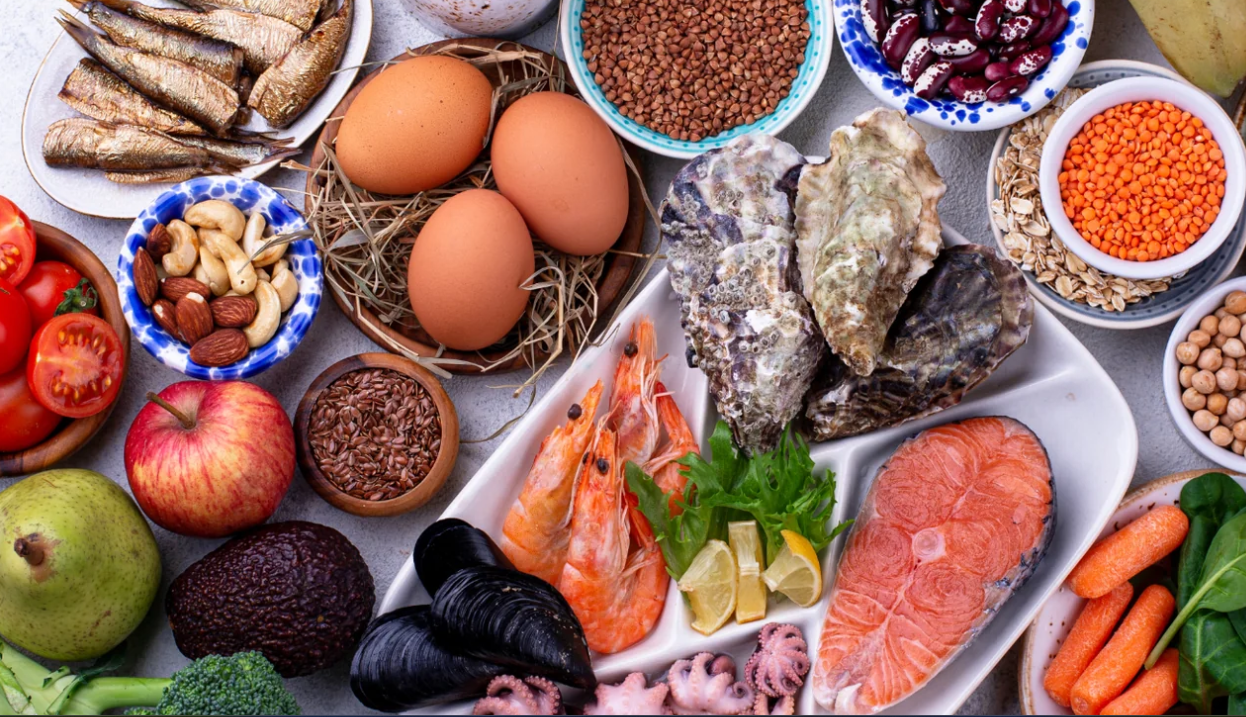The Mediterranean Diet: Healthy Eating Guide
The Mediterranean diet is known worldwide for being tasty and healthy. It comes from the cooking traditions of countries near the Mediterranean Sea. This diet focuses on plant-based foods and healthy fats, making it more than just a diet. It’s a way of life that boosts well-being and helps you live longer.
The Mediterranean diet centers on fresh fruits, veggies, whole grains, and lean proteins. Olive oil, a key ingredient, is the main source of healthy fats. This eating style is linked to many health benefits, like lower heart disease risk, better brain function, and weight control.
Following the Mediterranean diet means enjoying colorful, tasty meals that are good for your body. It’s a lasting and flexible eating plan that suits many tastes and lifestyles. This makes it a great choice for those looking for a healthy eating way of life.
Key Takeaways
- The Mediterranean diet emphasizes plant-based foods and healthy fats
- Olive oil is a key component of Mediterranean cuisine
- This eating plan is associated with numerous health benefits
- The diet is flexible and adaptable to various lifestyles
- Fresh fruits, vegetables, and whole grains form the foundation of meals
- It’s not just a diet, but a sustainable approach to healthy living
What is the Mediterranean Diet?
The Mediterranean diet is based on the traditional foods of countries near the Mediterranean Sea. It focuses on plant-based foods, healthy fats, and whole grains.
Origins and Cultural Significance
This diet comes from Greece, Italy, and other Mediterranean areas. It has grown over centuries. It shows the cultural values of these places, where food brings people together.
Key Principles of the Diet
The Mediterranean diet is all about:
- Loads of fruits and veggies
- Whole grains like quinoa and brown rice
- Healthy fats, mainly from olive oil
- Moderate amounts of fish and poultry
- Less red meat
Health Benefits Overview
Studies show the Mediterranean diet has many health perks:
| Benefit | Description |
|---|---|
| Heart Health | Reduces risk of heart disease |
| Weight Management | Helps keep a healthy weight |
| Brain Function | May boost brain function and lower dementia risk |
| Diabetes Prevention | Lowers risk of type 2 diabetes |
The Mediterranean diet promotes eating whole foods and balanced nutrition. It’s a lasting way to eat healthy that fits many lifestyles.
Essential Components of the Mediterranean Diet
The Mediterranean diet focuses on a few key elements. It emphasizes plant-based foods and healthy fats. This makes it a balanced and nutritious eating plan.
Olive oil is at the heart of Mediterranean cuisine. It’s used a lot in cooking, dressing salads, and as a bread dip. Olive oil is full of healthy fats and antioxidants. It helps lower inflammation and protects against chronic diseases.
Fruits and vegetables are big stars in Mediterranean meals. They are full of vitamins, minerals, and fiber. From juicy tomatoes to leafy greens, they offer a wide range of nutrients.
Seafood is also a big part of this diet. Fish like salmon, sardines, and mackerel are rich in omega-3 fatty acids. These fats are good for your brain and heart. Try to eat seafood at least twice a week.
Legumes like lentils, chickpeas, and beans are protein-rich. They are a plant-based alternative to meat. They also add a lot of fiber, which is good for your digestion and keeps you full.
| Component | Frequency | Benefits |
|---|---|---|
| Olive oil | Daily | Heart health, anti-inflammatory |
| Fruits and vegetables | Every meal | Vitamins, minerals, fiber |
| Seafood | 2-3 times per week | Omega-3 fatty acids, protein |
| Legumes | 3-4 times per week | Plant-based protein, fiber |
By adding these key components to your meals, you can enjoy the Mediterranean diet’s health benefits. You’ll also get to enjoy delicious and satisfying food.
The Power of Plant-Based Foods in Mediterranean Cuisine
Plant-based foods are the heart of Mediterranean cuisine. This diet highlights fruits, vegetables, and legumes. These foods are packed with nutrients and boost health.
Fruits and Vegetables: Colorful Nutrition
The Mediterranean diet loves a variety of fruits and vegetables. These foods are full of vitamins, minerals, and antioxidants. Tomatoes, leafy greens, and citrus fruits are favorites in many dishes.
Eating a variety of colorful produce ensures a wide range of nutrients. Here’s a quick look at some common Mediterranean fruits and vegetables:
| Fruit/Vegetable | Key Nutrients | Common Uses |
|---|---|---|
| Tomatoes | Lycopene, Vitamin C | Salads, Sauces, Grilled |
| Spinach | Iron, Folate | Salads, Cooked Dishes |
| Oranges | Vitamin C, Fiber | Fresh, Juiced, Zested |
Legumes: Protein-Packed Powerhouses
Legumes are key in Mediterranean eating. Beans, lentils, and chickpeas are rich in protein and fiber. They’re found in soups, stews, and salads throughout the region.
Nuts and Seeds: Healthy Snacking Options
Nuts and seeds add healthy fats and protein to the Mediterranean diet. Almonds, walnuts, and pumpkin seeds are great snacks or salad toppings. They bring crunch and nutrition to many dishes.
“Let food be thy medicine and medicine be thy food.” – Hippocrates
This ancient Greek wisdom fits perfectly with the Mediterranean diet. By focusing on plant-based foods, it nourishes both body and soul.
Whole Grains: The Foundation of Mediterranean Meals
Whole grains are key in the Mediterranean diet. They are packed with fiber, vitamins, and minerals. These nutrients support healthy eating. In Mediterranean cooking, you’ll find whole grains in bread and pasta dishes.
Ancient grains like farro, barley, and bulgur wheat are common in Mediterranean meals. They give you energy all day. Eating whole grains can help you stay healthy, manage weight, and improve digestion.
Mediterranean chefs are creative with whole grains. They make quinoa salads, whole wheat couscous, and brown rice pilafs. These ingredients soak up flavors, making meals tasty and good for you.
“Whole grains are not just nutritious, they’re delicious. They add texture and depth to Mediterranean dishes, making healthy eating a pleasure, not a chore.”
Start the Mediterranean diet by swapping refined grains for whole grains. Use whole grain bread instead of white, or try ancient grains in your recipes. Small changes can make a big difference in your health and introduce new tastes.
- Choose whole grain bread, pasta, and cereals
- Experiment with ancient grains like farro and quinoa
- Add barley or bulgur wheat to soups and stews
- Try whole grain couscous as a side dish
By focusing on whole grains, you’ll follow the Mediterranean diet’s heart-healthy ways.
Healthy Fats: Olive Oil and Beyond
The Mediterranean diet highlights the importance of healthy fats, with olive oil leading the way. This golden liquid is a key ingredient in Mediterranean cooking. It adds flavor and nutrition to many dishes.
The role of olive oil in Mediterranean cooking
Olive oil is more than just for salad dressings. It’s used for sautéing veggies, drizzling over pasta, and even baking. It’s full of heart-healthy fats that lower bad cholesterol and reduce inflammation. Its versatility makes it essential in any Mediterranean kitchen.
Other sources of healthy fats
While olive oil is a star, the Mediterranean diet also includes other healthy fats. Avocados, nuts, and fatty fish like salmon are part of this balanced eating plan. These foods provide essential nutrients and help you feel full and satisfied.
Balancing fat intake for optimal health
The secret to healthy fats is balance. The Mediterranean diet promotes moderate fat consumption while limiting saturated fats from red meat and dairy. By choosing plant-based fats and seafood, you can enjoy delicious meals that nourish your body and support overall health.
FAQ
What is the Mediterranean diet?
The Mediterranean diet is a way of eating that’s good for your heart. It focuses on plant-based foods, healthy fats, whole grains, seafood, and a bit of red wine. It comes from the traditional foods of countries near the Mediterranean Sea. It’s known for many health benefits.
What are the key principles of the Mediterranean diet?
This diet is all about eating lots of fruits, veggies, legumes, nuts, whole grains, and olive oil. It also suggests eating lean proteins like fish and poultry in moderation. But, it advises against too much red meat, processed foods, and sugar.
What are the health benefits of following the Mediterranean diet?
Following this diet can lower your risk of heart disease, stroke, type 2 diabetes, some cancers, and brain decline. It might also help you lose weight and improve your blood pressure and cholesterol levels.
What role does olive oil play in the Mediterranean diet?
Olive oil is key in the Mediterranean diet, serving as the main healthy fat source. It’s full of good fats and antioxidants. These offer many health benefits when eaten in the right amounts.
Are legumes an important part of the Mediterranean diet?
Yes, legumes like lentils, chickpeas, and beans are vital in the Mediterranean diet. They’re packed with plant-based protein, fiber, and nutrients. They add nutrition to any meal or dish.
How do whole grains fit into the Mediterranean diet?
Whole grains, like whole wheat, brown rice, quinoa, and bulgur, are essential in the Mediterranean diet. They offer important nutrients, fiber, and add texture and flavor to meals.
Is red wine allowed in the Mediterranean diet?
Yes, the Mediterranean diet suggests drinking red wine in moderation. It’s best to have it with meals. Drinking too much can undo the diet’s health benefits.


